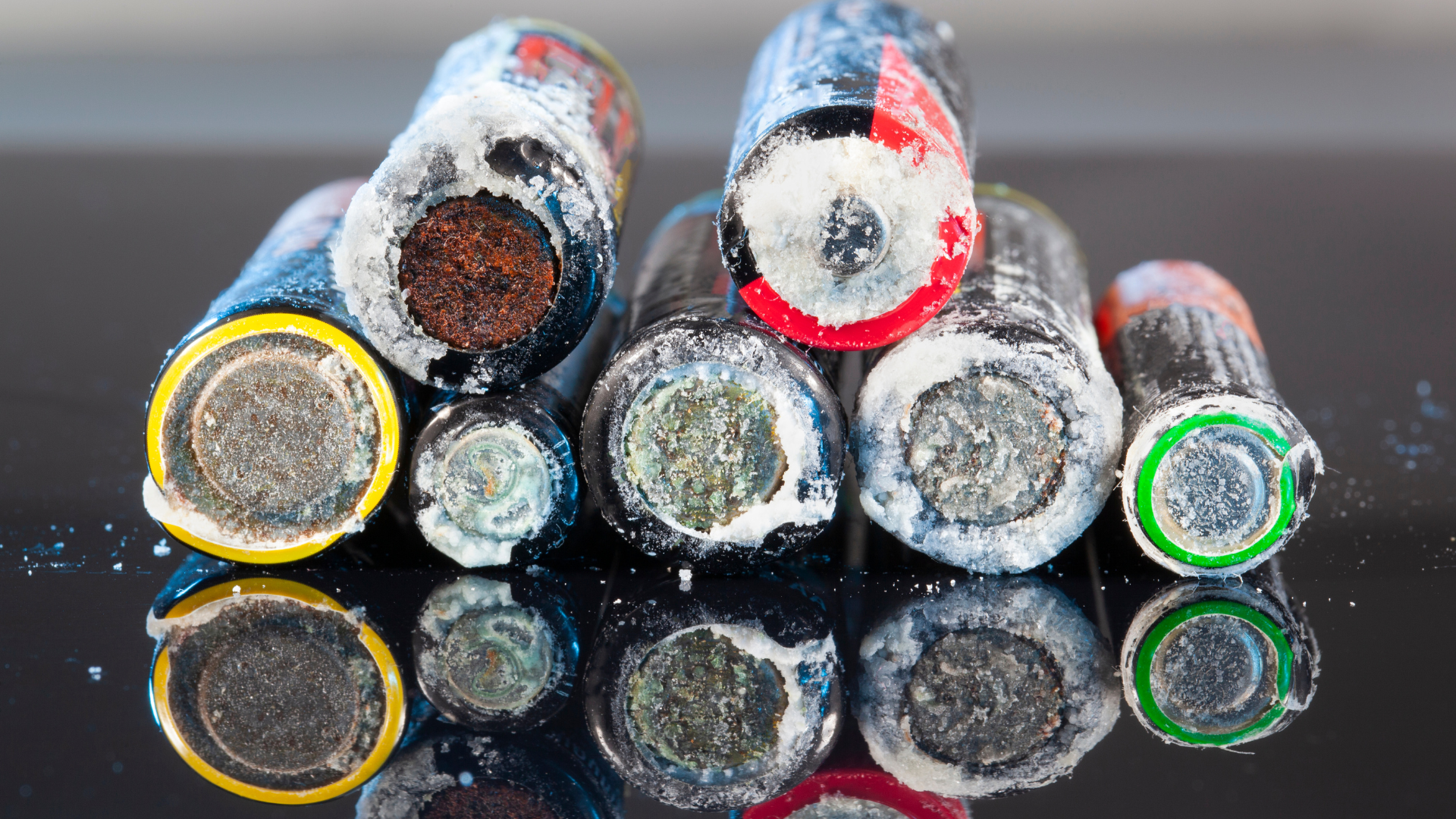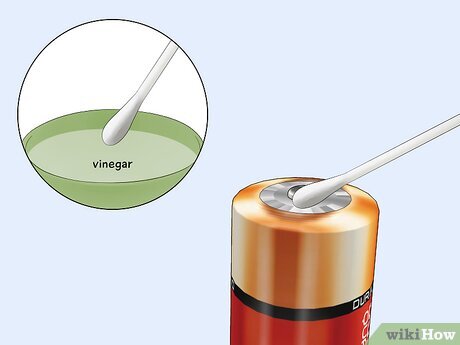Ever found yourself staring at a corroded battery, wondering if there’s an easy fix lurking in your kitchen cupboard? You’re not alone.
Many have turned to vinegar as a potential solution for neutralizing battery acid. But does it really work? Before you go splashing vinegar around, it’s crucial to know the facts. We’ll dive into what happens when vinegar meets battery acid and whether it’s a safe and effective method for tackling corrosion.
Uncover the truth about this common household remedy and learn how it can impact you and your electronics. Stick around; you might just save yourself from a sticky—and possibly hazardous—situation.
Battery Acid Basics
When you hear “battery acid,” you might imagine a hazardous liquid that can eat through metal. But what exactly is battery acid? Understanding its basics can help you handle it safely and effectively. Here’s everything you need to know about the composition, dangers, and whether vinegar can really neutralize it.
Composition Of Battery Acid
Battery acid is typically sulfuric acid, a powerful substance used in lead-acid batteries. It’s the key to conducting electricity, powering your car or gadgets efficiently. Despite its utility, it’s crucial to treat it with care. It’s not just any liquid; it has a potent chemical makeup that demands respect.
Imagine it as a secret agent in your car battery, silently working hard to keep everything running smoothly. But this agent can turn rogue if mishandled. Understanding its composition helps you appreciate both its usefulness and its risks.
Dangers Of Battery Acid Exposure
Battery acid can be harmful if it comes into contact with your skin or eyes. It can cause burns, irritation, or even severe injuries. Picture spilling your morning coffee but with consequences far worse than a stained shirt.
It’s not just personal harm you need to worry about. Battery acid can damage surfaces and materials, leading to costly repairs or replacements. Think about the last time you had to replace something unexpectedly—it’s never pleasant.
So, how do you protect yourself? Wearing protective gear like gloves and goggles is a must when handling batteries. But what if you’ve already spilled some acid—can vinegar really help?
Have you ever faced a battery acid spill? How did you handle it? Sharing experiences can be insightful, especially when considering alternatives like vinegar for neutralization.
Properties Of Vinegar
Vinegar is a common household item with intriguing properties. It’s known for its sharp taste and pungent smell. Derived from the fermentation of ethanol by acetic acid bacteria, vinegar has diverse applications. Its chemical properties make it useful in cooking, cleaning, and other household tasks. Understanding its properties can help determine if vinegar can neutralize battery acid.
Acidity Levels In Vinegar
Vinegar’s acidity comes from acetic acid. The acetic acid content in vinegar typically ranges from 4% to 8%. This makes it a mild acid. Despite being mild, vinegar’s acidity is enough for many cleaning tasks. But battery acid is much stronger. Battery acid is sulfuric acid, which is highly corrosive. The mild acidity of vinegar might not fully neutralize strong acids like battery acid.
Common Uses Of Vinegar
Vinegar is versatile in homes. It’s often used in cooking for flavoring and preservation. Cleaning is another common use. Vinegar can remove stains and odors. It’s also used in health remedies, like soothing sunburns. Gardeners use vinegar to kill weeds. Its antimicrobial properties make it handy for sanitizing surfaces. These uses stem from its acidity and natural composition. Despite its versatility, vinegar’s effectiveness against battery acid is questionable.
Vinegar As A Cleaning Agent
Vinegar proves useful for neutralizing battery acid spills. Its acetic acid content effectively counters the alkaline nature of battery acid. Always use with caution and proper safety measures.
Vinegar has been a staple in households for generations. Many use it for cleaning due to its acidic properties. This natural solution is affordable and versatile. It tackles dirt, grime, and stains effectively. But can it handle battery acid? Let’s explore vinegar’s capabilities.
Effectiveness On Household Stains
Vinegar excels at removing common household stains. It works well on coffee, wine, and juice spills. Its acidity breaks down stains, making them easier to remove. People use it to clean glass, tiles, and mirrors. Vinegar leaves surfaces sparkling and residue-free.
Limitations Of Vinegar In Cleaning
Vinegar’s acidity has its limits. It may not neutralize battery acid effectively. Battery acid is strong and corrosive. Vinegar’s mild nature may not fully counteract it. Specialized cleaners might be required for safety. Always handle battery acid with caution.
Myth Of Vinegar Neutralizing Battery Acid
Many believe vinegar can neutralize battery acid, but it’s not true. Vinegar contains acetic acid, which can worsen the acid spill. Instead, baking soda is a safer choice for neutralizing battery acid.
Battery acid leaks can be a daunting situation. Many people have heard the common advice to use vinegar to neutralize it. But is this effective or just another household myth? Understanding the truth can save you time and protect your belongings.
Origins Of The Myth
The idea that vinegar can neutralize battery acid likely comes from its popularity as a cleaning agent. Vinegar is known for its ability to tackle various stains and messes. Perhaps you’ve used it to clean your kitchen or bathroom before. But battery acid is a different beast. It’s far more corrosive than everyday spills. The myth might stem from the fact that vinegar is acidic itself, leading people to think it can counteract other acids.
Scientific Evidence
Science tells us vinegar is not the best choice for neutralizing battery acid. Vinegar is acetic acid, while battery acid is sulfuric acid. Their chemical reactions don’t result in neutralization. Imagine pouring vinegar on battery acid. The reaction might produce a bit of fizz, but it doesn’t neutralize the danger. Science recommends using a base like baking soda to neutralize battery acid effectively. In reality, using vinegar could worsen the situation, rather than resolving it. Why risk it when proven alternatives exist? Have you tried using vinegar for battery acid before? What was your experience? It’s crucial to share practical insights and rethink these household myths. Next time you face battery acid, remember to use baking soda instead. You’ll save yourself the hassle and ensure safety.
Proper Neutralization Methods
Vinegar can neutralize battery acid due to its acidic nature, which reacts with the alkaline substance. Using vinegar is a simple household method to safely clean small acid spills. Always ensure proper safety measures while handling.
Neutralizing battery acid is a crucial step in ensuring safety and maintaining the longevity of your car or electronic device. You might have heard that vinegar can neutralize battery acid, but is it the best method? Let’s dive into the proper neutralization techniques to keep you safe and your equipment in top condition.
Recommended Materials
When neutralizing battery acid, you need to have the right materials on hand. Baking soda is your best friend in this scenario. It effectively neutralizes the acid without causing additional damage. Consider having a soft cloth or sponge to apply the baking soda solution. Keeping a small, dedicated brush can help in hard-to-reach areas. Always have a container of clean water ready to rinse the area after neutralization. This ensures no residual acid or baking soda remains.
Safety Precautions
Safety should be your top priority when dealing with battery acid. Always wear protective gloves and goggles. These prevent acid from coming into contact with your skin and eyes. Ensure you’re working in a well-ventilated area. This minimizes the inhalation of harmful fumes. If possible, perform the task outdoors. Never mix vinegar with baking soda directly on the battery. The reaction can be too vigorous and unpredictable. Stick to using baking soda for a safer approach. Have you ever considered how simple safety measures can prevent major accidents? Taking the time to prepare correctly can save you from costly repairs and medical bills.
Alternative Solutions
Battery acid leaks can be a real headache. Whether it’s a car battery or a household device, dealing with acid spills requires quick action. While vinegar is a popular home remedy, it’s not the only solution out there. There are alternative methods that might be more effective or convenient for you.
Commercial Neutralizers
Did you know there are products specifically designed to neutralize battery acid? These commercial neutralizers are formulated to safely handle acid spills. They often come in spray bottles or powders, making application straightforward.
One popular choice is baking soda-based solutions. They react with the acid to form harmless compounds. You simply sprinkle or spray the neutralizer onto the spill and wait for it to work its magic.
Consider investing in a commercial product if you frequently deal with battery acid. It’s a small price for peace of mind.
Diy Remedies
You’re probably wondering if there are DIY remedies besides vinegar. The answer is yes! Common household items can also help neutralize battery acid.
Baking soda is a fantastic option. Mix it with water to form a paste. Apply it to the acid spill and watch as it neutralizes the harmful substance.
Another option is mild soap and water. This might sound surprising, but it can effectively dilute and neutralize the acid. Use a soft cloth to gently clean the affected area.
Have you tried these methods? If not, it might be time to experiment. You might find a new go-to solution for battery acid spills.
Safety Tips For Handling Battery Acid
Dealing with battery acid requires caution. This corrosive substance can cause harm if mishandled. Follow these safety tips to protect yourself and others. Proper gear and knowledge are essential when handling battery acid.
Protective Gear
Always wear protective gear. Goggles shield your eyes from splashes. Gloves keep your hands safe. Use long sleeves to protect your arms. A mask can prevent inhaling fumes. Ensure your gear fits well. Secure all gear before starting.
First Aid Measures
Know first aid measures for battery acid exposure. If acid contacts skin, rinse with water immediately. Remove contaminated clothing quickly. Seek medical help if irritation persists. For eye exposure, wash eyes for 15 minutes. Avoid rubbing the eyes. Call a doctor if vision is blurred.

Credit: www.globalhazmat.com
FAQs on Does Vinegar Neutralize Battery Acid
Can Vinegar Neutralize Battery Acid Effectively?
Vinegar can neutralize battery acid but isn’t the best choice. It contains acetic acid which can react with sulfuric acid in batteries. However, a baking soda and water solution is more effective for neutralization and cleaning.
Is Vinegar Safe For Cleaning Battery Acid Spills?
Vinegar isn’t the safest option for battery acid spills. It can react with the acid, creating harmful fumes. Instead, use baking soda mixed with water for a safer and more effective clean-up solution.
What Household Item Neutralizes Battery Acid?
Baking soda is a common household item that neutralizes battery acid effectively. It reacts with the acid, neutralizing it, and making the area safe to handle. Mix it with water to form a paste for application.
How Does Vinegar Compare To Baking Soda For Acid Neutralization?
Vinegar is less effective than baking soda for battery acid neutralization. Vinegar’s acetic acid isn’t strong enough to fully neutralize sulfuric acid. Baking soda’s alkaline nature makes it a more suitable and efficient option.
Conclusion
Vinegar can help clean small battery acid spills. It neutralizes some acids. But caution is key. Larger spills need professional help. Vinegar alone might not be enough. Always wear gloves for safety. Remember, battery acid is dangerous. Proper disposal is crucial.
Store batteries in a safe place. Regular checks prevent leaks. Use vinegar wisely. It’s a simple solution for minor issues. For major ones, seek expert advice. Safety first. Keep batteries away from children. Stay informed. Make smart choices. Understanding battery acid is important.
Vinegar is a helpful tool, but not a cure-all.

